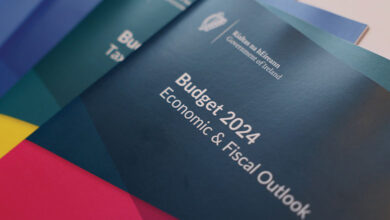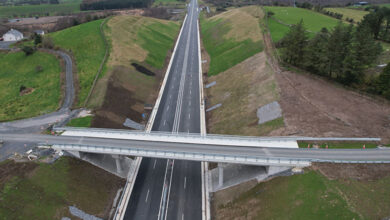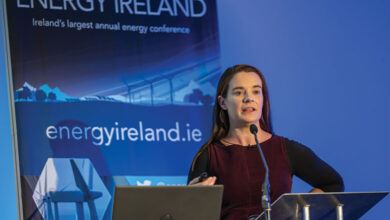PPPs: Small scale usage
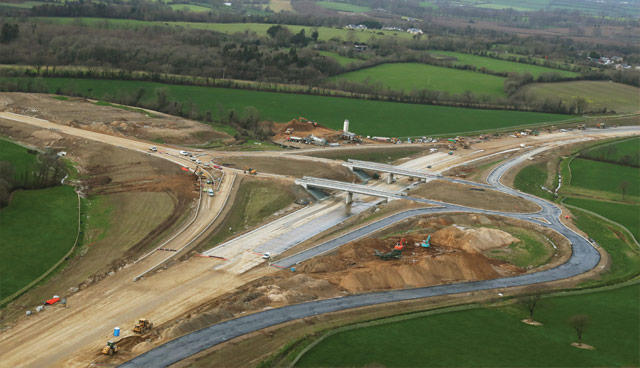
Recognised for their value of mitigating risk to the public purse, indications are that PPPs are to be given a much smaller role than could be expected in Ireland’s long-term infrastructure planning. eolas examines profiles some of the current and future plans for PPP projects.
Significant overspends recently revealed in two large state-funded infrastructure projects: The National Broadband Plan and the National Children’s Hospital, have once again brought into focus the levels of risk associated with exchequer-funded projects to the public purse and asked the question as to whether more Public Private Partnerships (PPPs) should be utilised to offset such risks in future infrastructure development.
The National Development Plan gave a firm indication of the Government’s preference for exchequer-funded public capital investment over PPPs and opted against either utilising PPPs as an alternative mechanism to exchequer funding to deliver the NDP or to deliver additional projects under a separate PPP programme.
Instead, the Government review into using PPPs in Ireland outlined a preference for additional PPP models to be developed to suit smaller scale projects, mitigating against the possibility that an additional programme of projects would put additional pressure on the capacity of the, construction sector to deliver on the NDPs ambitions.
In Ireland, the most common utilisation of PPPs fall under the categories of:
- Design, Build and Operate (DBO) – Waste water projects;
- Design, Build, Finance, Operate Maintain (DBFOM) – the schools bundle; and
- Concession – Toll Roads.
PPPs are attractive for a range of reasons including keeping costs off balance sheet and incentivised competition times and more rigorous management by the private sector. The largest incentive is the ability to share risk on a project, meaning any additional financial costs are not borne solely by the public purse.
However, they also come with the caveat of a much greater level of detail needed to establish the entire cost of the project over its lifespan, more expensive private sector borrowing and necessary guarantees that the private participant has a long-term sustainable future. The recent collapse of Britain’s second largest contractor Carillion, despite an annual turnover of over £5 billion, highlighted the unpredictability of long-term partner assessment.
The major focus for PPP usage in Ireland in the course of Project Ireland 2040 appears to lie in higher education. The Government says that €2.8 billion, including PPP investments and support for research, will be invested in the sector over the project’s lifetime. The NDP sets out that 11 major infrastructure projects will be delivered around the country as part of a PPP Programme for the higher education sector at Athlone IT (AIT), IT Blanchardstown, IT Carlow, CIT, Dun Laoghaire Institute of Art, Design and Technology, GMIT, Limerick IT, Letterkenny IT, IT Tallaght, IT Tralee and WIT.
In January, Minister for Education and Skills Joe McHugh TD and Minister of State for Higher Education Mary Mitchell O’Connor TD issued a call for applications to higher education institutions in relation to the newly established Higher Education Strategic Infrastructure Fund.
A total of €80 million is to be available to leverage non-Exchequer sources of funding for investment in higher education, with the aim of achieving at least 50 per cent match funding across the programme as a whole.
 TUD Campus at Grangegorman
TUD Campus at Grangegorman
Announced in 2010 as part of a major new urban regeneration development programme, the former DIT Campus at Grangegorman – East and Central Quads Public Private Partnership Programme was part of plans to include state of the art mental health facilities, a purpose-built third level education campus for TUD and a variety of public amenities, to be built on the grounds of St. Brendan’s Hospital in Grangegorman in Dublin 7.
The PPP element is being delivered under a single contract to design, build, finance and maintain two two quads for 25 years. The buildings are scheduled to be ready for occupation by the 2020/21 academic year.
Exchequer funded financial commitments
Operational: 2020
Contractual value: €220 million
Projected Total Cost of all PPP Payments: €602.6 million
Year of final payment: 2045
PPP company: Eriugena Consortium
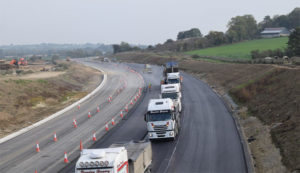 M11 Gorey to Enniscorthy
M11 Gorey to Enniscorthy
The scheme comprises of a new motorway from the end of the Gorey Bypass at Clogh to the townland of Scurlockbush, south of Enniscorthy. The scheme also includes a bypass of the N30 to the west of Enniscorthy and a link road to the N80.
Exchequer funded financial commitments
Operational: July 2019
Contractual value: €234.5 million
Projected Total Cost of all PPP Payments: €519.1 million
Year of final payment: 2044
PPP company: Gorey to Enniscorthy M11 PPP Limited
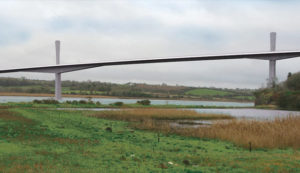 N25 New Ross Bypass
N25 New Ross Bypass
Encompasses a 14-kilometre dual carriageway, new sections of both the N25 and N30 and a three tower, 900-metre extrados bridge between Pink Point and Strokestown, the scheme, which ties in with the N30 at Corcorans Cross was due for completion in summer 2019 but will now likely not be finished until 2020.
Exchequer funded financial commitments
Operational: completion expected in 2020
Contractual value: €150.5 million
Projected Total Cost of all PPP Payments: €337.5 million
Year of final payment: 2044
PPP company: New Ross N25 Bypass Designated Activity Company
 Schools Bundle 5
Schools Bundle 5
Three bundles of eighteen schools have already been delivered by the NDFA. Schools PPP Bundles 4 and 5 are two discreet bundles being procured under a single contract notice using the negotiated procedure. Schools PPP Bundle 5 comprises six facilities: five replacement schools and one replacement Institute of Further Education. These are Ravenswell Primary School, Bray, County Wicklow; Coláiste Ráithín, Bray, County Wicklow (Post Primary); Eureka Secondary School, Kells, County Meath (Post Primary); Loreto College, County Wexford (Post Primary); Tyndall College, County Carlow (Post Primary); and Carlow Institute of Further Education & Training, County Carlow.
Exchequer funded financial commitments
Operational: 2018
Contractual value: €90.9 million
Projected Total Cost of all PPP Payments: €272.9 million
Year of final payment: 2043
PPP company: Inspired Spaces Consortium



